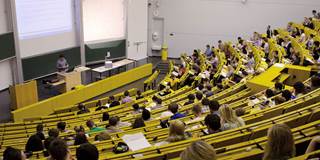A few decades ago, it was widely assumed that progress in mass education would gradually bridge the gap between scientific knowledge and popular belief, thereby contributing to a more serene and more rational democracy. The evidence is that it has not.
PARIS – Last month, I wrote a commentary asking why voters in the United Kingdom supported leaving the European Union, defying the overwhelming weight of expert opinion warning of the major economic costs of Brexit. I observed that many voters in the UK and elsewhere are angry at economic experts. They say that the experts failed to foresee the financial crisis of 2008, put efficiency first in their policy advice, and blindly assumed that the losers from their policy prescriptions could be compensated in some unspecified way. I argued that experts should be humbler and more attentive to distributional issues.
The piece elicited far more comments from readers than any of my others. Their reactions mostly confirm the anger I had noted. They regard economists and other experts as isolated from and indifferent to the concerns of ordinary people; driven by an agenda that does not coincide with that of citizens; often blatantly wrong, and therefore incompetent; biased in favor of, or simply captured by, big business and the financial industry; and naive – failing to see that politicians select analyses that suit their ends and disregard the rest. Experts, said some, are also guilty of fracturing society by segmenting the debate into myriad narrow, specialized discussions.
Remarkably, I also received comments from professionals in the natural sciences who said that citizens’ growing distrust of experts was pervasive in their disciplines, too. Scientific views in fields like energy, climate, genetics, and medicine face widespread popular rejection. In the United States, for example, a Pew Research survey found that 67% of adults think that scientists lack a clear understanding about the health effects of genetically modified organisms. Mistrust of GMOs is even higher in Europe. Whereas overall support for science remains strong, many citizens believe that it is manipulated by special interests, and on some issues, the common view departs from the established evidence.

PARIS – Last month, I wrote a commentary asking why voters in the United Kingdom supported leaving the European Union, defying the overwhelming weight of expert opinion warning of the major economic costs of Brexit. I observed that many voters in the UK and elsewhere are angry at economic experts. They say that the experts failed to foresee the financial crisis of 2008, put efficiency first in their policy advice, and blindly assumed that the losers from their policy prescriptions could be compensated in some unspecified way. I argued that experts should be humbler and more attentive to distributional issues.
The piece elicited far more comments from readers than any of my others. Their reactions mostly confirm the anger I had noted. They regard economists and other experts as isolated from and indifferent to the concerns of ordinary people; driven by an agenda that does not coincide with that of citizens; often blatantly wrong, and therefore incompetent; biased in favor of, or simply captured by, big business and the financial industry; and naive – failing to see that politicians select analyses that suit their ends and disregard the rest. Experts, said some, are also guilty of fracturing society by segmenting the debate into myriad narrow, specialized discussions.
Remarkably, I also received comments from professionals in the natural sciences who said that citizens’ growing distrust of experts was pervasive in their disciplines, too. Scientific views in fields like energy, climate, genetics, and medicine face widespread popular rejection. In the United States, for example, a Pew Research survey found that 67% of adults think that scientists lack a clear understanding about the health effects of genetically modified organisms. Mistrust of GMOs is even higher in Europe. Whereas overall support for science remains strong, many citizens believe that it is manipulated by special interests, and on some issues, the common view departs from the established evidence.